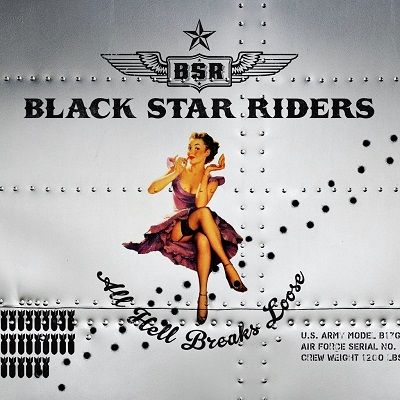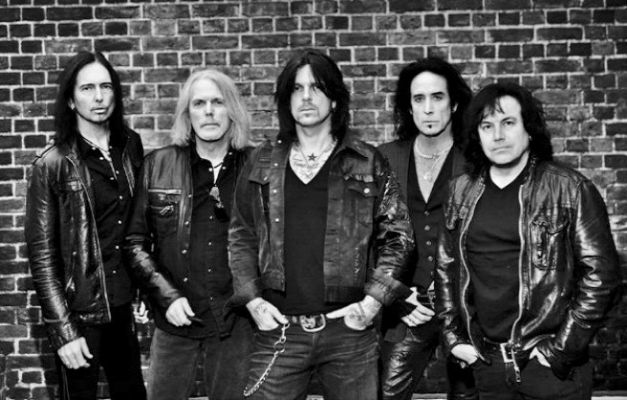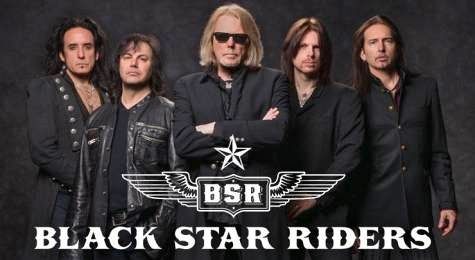Post by Erik Rupp on May 25, 2013 20:55:54 GMT -5


When John Sykes, Scott Gorham, and Darren Wharton reformed Thin Lizzy in the late 90's a lot of people questioned the legitimacy of using that band name. Thin Lizzy, of course, was largely the product of bass player/singer Phil Lynott's musical vision. Lynott wrote most (but not all) of Lizzy's songs, and he was their lead singer. His death in 1986 seemed to put an end to any future Thin Lizzy activity, but as we found out Gorham, Sykes, and Wharton had other ideas over a decade later.
And, truth be told, the resulting performances by the new Thin Lizzy (also featuring Marco Mendoza on bass and Tommy Aldridge on drums) were spectacular. Sykes' vocals were excellent and even echoed Lynott to a degree. The band was tight and powerful and maintained the Thin Lizzy sound. And still the criticism was there. Many fans just couldn't accept Lizzy without Lynott, even if it was intended to be a tribute to their fallen friend.
In 2009 Sykes left (or was nudged out of) the band, and ex Almighty vocalist Ricky Warwick was brought in to front the band. Brian Downey, the band's original drummer, rejoined the band, and Vivian Campbell of Dio and Def Leppard fame took over on guitar as his schedule allowed. Eventually, former Brother Cane and Alice Cooper guitar player Damon Johnson took the spot and the band's line-up was set. Until they started writing new material in 2012.
When plans for recording an album started Brian Downey decided to depart the band. Without the only original member in the band it made recording an album under the Thin Lizzy name seem like a stretch. The band members had already had some concerns about releasing an album of, "New Thin Lizzy songs," so the decision was made to change the band name.
Former Y&T, Suicidal Tendencies, and Megadeth drummer Jimmy DeGrasso filled out the band, and they headed in to the studio to record what would become All Hell Breaks Loose.
The result?
An album worthy of the Thin Lizzy name, and that's saying a lot.
All Hell Breaks Loose is a fantastic hard rock album with a ton of great songs. This is what the Thin Lizzy of 1976 may have sounded like if they were transported forward in time 35 years. Everything here is rooted in the mid to late 70's, with a knowledge of and influence from multiple hard rock styles that followed over the next 30 years. This would have made a great Thin Lizzy album had Brian Downey been on the album (and that's not a slight on Jimmy DeGrasso's performance in any way - he's excellent here), but the trepidation of Gorham and Downey was understandable. The emotional ties to Lynott by the fans run strong, and no matter how good the album was (or is) some of them just weren't going to accept it as, "Thin Lizzy."
So the right call was made, but no matter what the name is on the cover, the music is the spiritual follower of Thin Lizzy.
The album runs the gamut from uptempo rockers to a moody, blues influenced track. The uptempo tracks include the title track (which is similar to a more dynamic and moody, "Bad Reputation"), the lead single, "Bound For Glory," (which sounds like it could have been written for the underrated Chinatown album), and, "Valley of the Stones," (which sounds a bit like a fast, heavy mid 80's Gary Moore song).
The mid tempo songs vary more in style; "Bloodshot," (this time like a grinding Gary Moore tune, with a great groove and some great riffs and vocal melodies); "Kissin' the Ground," (which shows the band taking inspiration from Brother Cane to a degree on this straightforward melodic but rough around the edges track); and, "Kingdom of the Lost," (which sounds like Gary Moore doing his Irish Rock thing on Wild Frontier). "Hey Judas," is another track worth mentioning. It is very much in line with Thin Lizzy's best material from the 70's, and Ricky Warwick even sounds a lot like Phil Lynott in his phrasing here. It is yet another great track on a great album.
The album closes out with the moody, grooving, blues inspired (but not terribly bluesy), "The Blues Ain't So Bad." This is a little more modern and it is a fairly dynamic track. It's a very good song to end a great album. It feels like the end of the album, winding down the proceedings with style and a fair amount of class.
Album highlights? Tracks 1-11. OK, if I had to pick some favorites this early I'd probably say, "Bound For Glory," "Bloodshot," "All Hell Breaks Loose," "Hey Judas," "Hoodoo Voodoo," and, "Valley of the Stones." But even the tracks I haven't mentioned are worthy additions to the album. There isn't a full-on dud in the entire group. Everything works in context of the album as a whole.
The album was produced by the extremely busy Kevin Shirley (Iron Maiden, Journey, Black Country Communion), and this is one of the better sounding albums that he has produced. There is a little sonic room for the instruments to breathe, and there's some decent high end there for a change so it sounds really good. Another mark in the win column.
The end result of Thin Lizzy's reformation is the Black Star Riders and their first album, All Hell Breaks Loose. Given the great shows under the Thin Lizzy name, and the great album under the Black Star Riders name, putting the band back together was a good thing. Very good.
4.5/5


